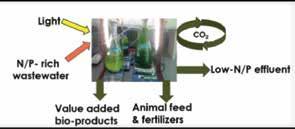
In the vicinity of IIT Bombay campus lies Powai lake, known for its varied flora and fauna. But over the years in recent past, the lake has undergone enormous eutrophication (algal bloom) due to reckless discharge of untreated domestic effluents into the lake. This pathetic sight of a dirty lake is an eye sore for the public besides the slow decay of the lake. Hence, in order to find an effective remediation, our group along in collaboration with Prof. Yen Wah Tong from National University of Singapore is working to check water pollution in urban localities using green algae. Conical flasks and cylindrical reactors are being used to grow green algae for treatment of municipal wastewater.
We have isolated indigenous algae consortium from Powai lake (Mumbai) to develop in-house biological method of treating domestic effluents. The main focus of the research is to use algae for consuming nitrogen (in form of ammonia/ nitrate) and phosphorus from the domestic discharge. Green algae utilise nutrients load as their food from wastewater in presence of visible light by the process of photosynthesis and produce oxygen thereby treating wastes. Algal systems can achieve phosphorus limit even below 1 ppm which otherwise is an unrealistic target for conventional wastewater treatment plants operated with bacterial systems. Algal processes create alkaline condition and thereby suppress coliform bacteria. We are also hopeful of various other benefits and outcomes from this project like uptake of carbon dioxide (from flue gas) by the algae and use of dried algae harvest as bio-fertiliser. We claim that this approach which can be integrated with city gardens is eco-friendly and sustainable in the long run.
Prof. A K Dikshit
